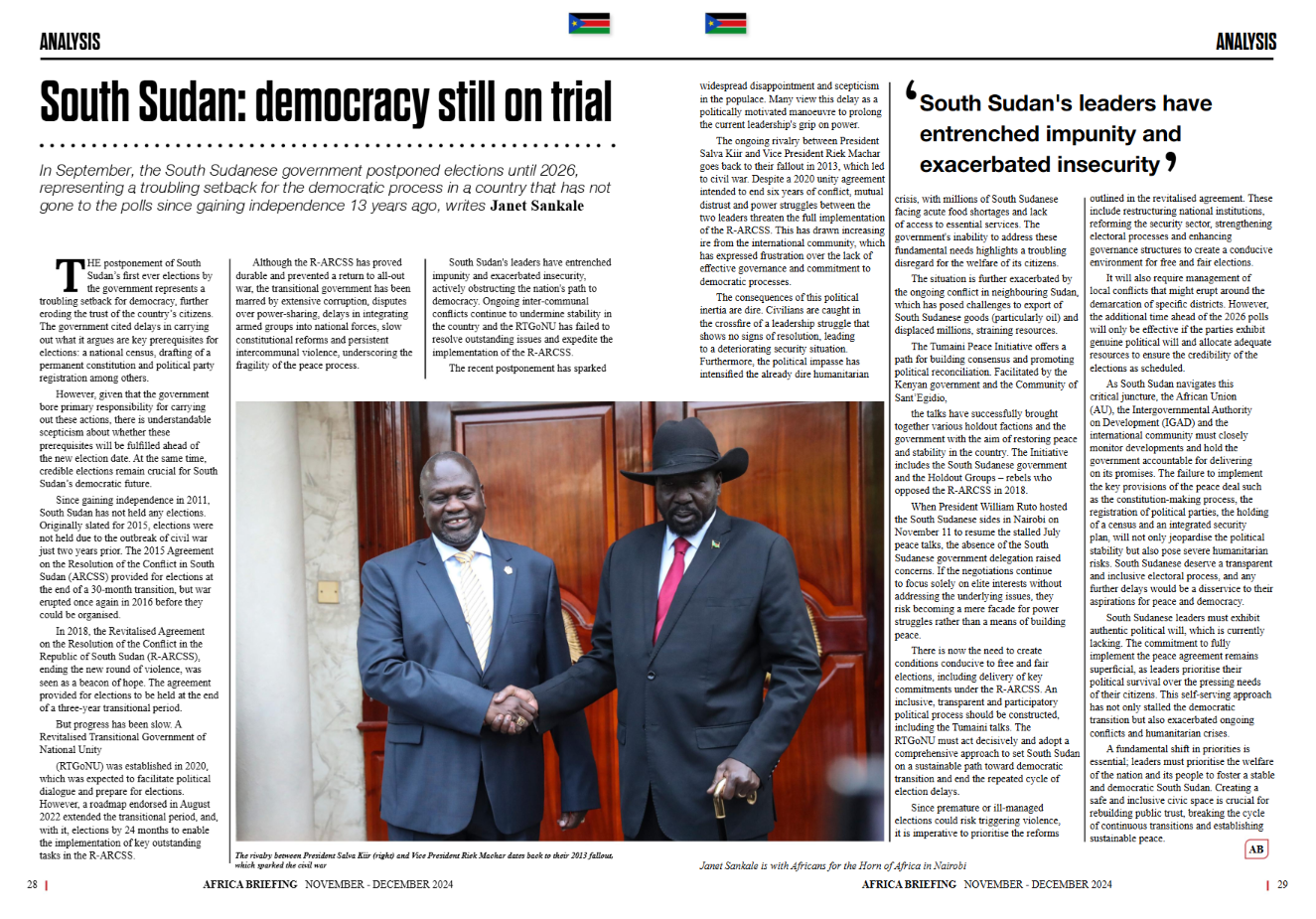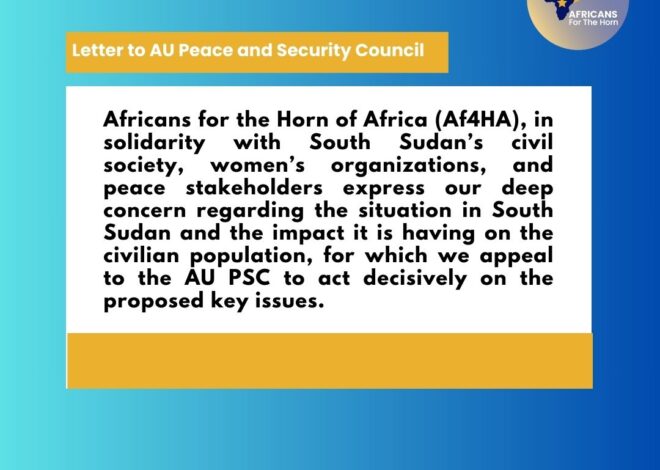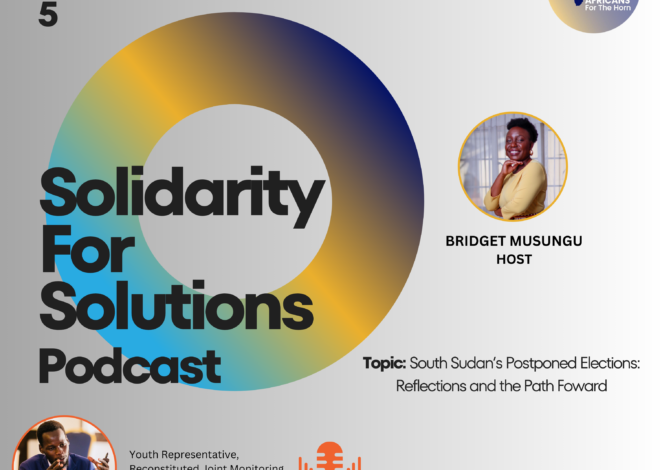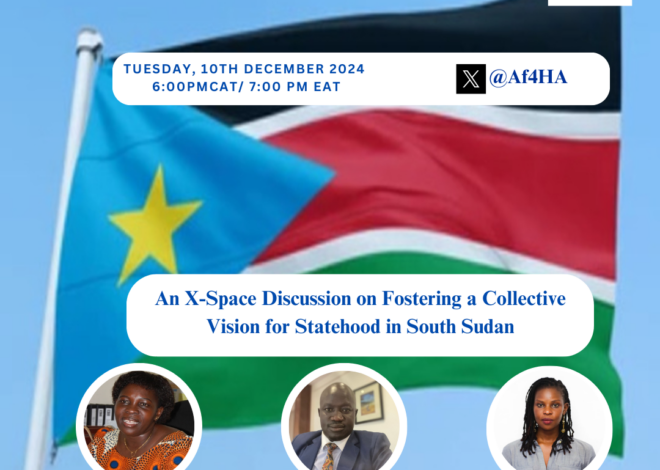
South Sudan: democracy still on trial
In September, the South Sudanese government postponed elections until 2026, representing a troubling setback for the democratic process in a country that has not gone to the polls since gaining independence 13 years ago, writes Janet Sankale
Africa Briefing
The postponement of South Sudan’s first ever elections by the government represents a troubling setback for democracy, further eroding the trust of the country’s citizens. The government cited delays in carrying out what it argues are key prerequisites for elections: a national census, drafting of a permanent constitution and political party registration among others.
However, given that the government bore primary responsibility for carrying out these actions, there is understandable scepticism about whether these prerequisites will be fulfilled ahead of the new election date. At the same time, credible elections remain crucial for South Sudan’s democratic future.
Since gaining independence in 2011, South Sudan has not held any elections. Originally slated for 2015, elections were not held due to the outbreak of civil war just two years prior. The 2015 Agreement on the Resolution of the Conflict in South Sudan (ARCSS) provided for elections at the end of a 30-month transition, but war erupted once again in 2016 before they could be organised.
In 2018, the Revitalised Agreement on the Resolution of the Conflict in the Republic of South Sudan (R-ARCSS), ending the new round of violence, was seen as a beacon of hope. The agreement provided for elections to be held at the end of a three-year transitional period.
But progress has been slow. A Revitalised Transitional Government of National Unity (RTGoNU) was established in 2020, which was expected to facilitate political dialogue and prepare for elections. However, a roadmap endorsed in August 2022 extended the transitional period, and, with it, elections by 24 months to enable the implementation of key outstanding tasks in the R-ARCSS.
Although the R-ARCSS has proved durable and prevented a return to all-out war, the transitional government has been marred by extensive corruption, disputes over power-sharing, delays in integrating armed groups into national forces, slow constitutional reforms and persistent intercommunal violence, underscoring the fragility of the peace process.
South Sudan’s leaders have entrenched impunity and exacerbated insecurity, actively obstructing the nation’s path to democracy. Ongoing inter-communal conflicts continue to undermine stability in the country and the RTGoNU has failed to resolve outstanding issues and expedite the implementation of the R-ARCSS.
The recent postponement has sparked widespread disappointment and scepticism in the populace. Many view this delay as a politically motivated manoeuvre to prolong the current leadership’s grip on power.
The ongoing rivalry between President Salva Kiir and Vice President Riek Machar goes back to their fallout in 2013, which led to civil war. Despite a 2020 unity agreement intended to end six years of conflict, mutual distrust and power struggles between the two leaders threaten the full implementation of the R -ARCSS. This has drawn increasing ire from the international community, which has expressed frustration over the lack of effective governance and commitment to democratic processes.
The consequences of this political inertia are dire. Civilians are caught in the crossfire of a leadership struggle that shows no signs of resolution, leading to a deteriorating security situation. Furthermore, the political impasse has intensified the already dire humanitarian crisis, with millions of South Sudanese facing acute food shortages and lack of access to essential services. The government’s inability to address these fundamental needs highlights a troubling disregard for the welfare of its citizens.
The situation is further exacerbated by the ongoing conflict in neighbouring Sudan, which has posed challenges to export of South Sudanese goods (particularly oil) and displaced millions, straining resources.
The Tumaini Peace Initiative offers a path for building consensus and promoting political reconciliation. Facilitated by the Kenyan government and the Community of Sant’Egidio, the talks have successfully brought together various holdout factions and the government with the aim of restoring peace and stability in the country. The Initiative includes the South Sudanese government and the Holdout Groups – rebels who opposed the R-ARCSS in 2018.
When President William Ruto hosted the South Sudanese sides in Nairobi on November 11 to resume the stalled July peace talks, the absence of the South Sudanese government delegation raised concerns. If the negotiations continue to focus solely on elite interests without addressing the underlying issues, they risk becoming a mere facade for power struggles rather than a means of building peace.
There is now the need to create conditions conducive to free and fair elections, including delivery of key commitments under the R-ARCSS. An inclusive, transparent and participatory political process should be constructed, including the Tumaini talks. The RTGoNU must act decisively and adopt a comprehensive approach to set South Sudan on a sustainable path toward democratic transition and end the repeated cycle of election delays.
Since premature or ill-managed elections could risk triggering violence, it is imperative to prioritise the reforms outlined in the revitalised agreement. These include restructuring national institutions, reforming the security sector, strengthening electoral processes and enhancing governance structures to create a conducive environment for free and fair elections.
It will also require management of local conflicts that might erupt around the demarcation of specific districts. However, the additional time ahead of the 2026 polls will only be effective if the parties exhibit genuine political will and allocate adequate resources to ensure the credibility of the elections as scheduled.
As South Sudan navigates this critical juncture, the African Union (AU), the Intergovernmental Authority on Development (IGAD) and the international community must closely monitor developments and hold the government accountable for delivering on its promises. The failure to implement the key provisions of the peace deal such as the constitution-making process, the registration of political parties, the holding of a census and an integrated security plan, will not only jeopardise the political stability but also pose severe humanitarian risks. South Sudanese deserve a transparent and inclusive electoral process, and any further delays would be a disservice to their aspirations for peace and democracy.
South Sudanese leaders must exhibit authentic political will, which is currently lacking. The commitment to fully implement the peace agreement remains superficial, as leaders prioritise their political survival over the pressing needs of their citizens. This self-serving approach has not only stalled the democratic transition but also exacerbated ongoing conflicts and humanitarian crises.
A fundamental shift in priorities is essential; leaders must prioritise the welfare of the nation and its people to foster a stable and democratic South Sudan. Creating a safe and inclusive civic space is crucial for rebuilding public trust, breaking the cycle of continuous transitions and establishing sustainable peace.
Janet Sankale is with Africans for the Horn of Africa in Nairobi.
Read the original article on Africa Briefing



